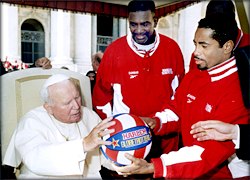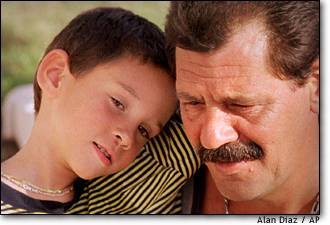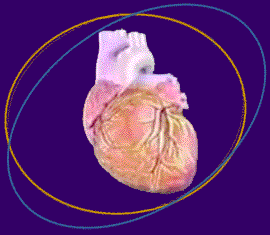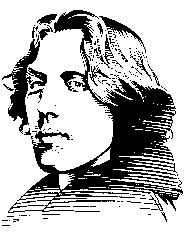Births which
occurred on a November 30:
1960
The First International Harvester Scout vehicle
The first Scout all-terrain vehicle
rolled off the assembly line at International Harvester's Fort Wayne
plant. The history of International Harvester dates back to the early
1800s, when the company sold Cyrus McCormick's mechanical reaper.
Around the turn of the century, the company took the name of International
Harvester (IH), and in 1907 produced the Auto Buggy, an early motorized
truck marketed to farmers. During the next few decades, IH specialized
in industrial vehicles and agricultural machinery. During the 1950s,
IH truck production flourished with the rapid emergence of interstate
highways. In 1959, IH began work on a new 4x4 utility vehicle, which
would be offered to the average American as an alternative to the
popular Jeep vehicle. Designed by Ted Ornas, the first Scout was introduced
to the public as a versatile, affordable vehicle for both passenger
and cargo transport. It was available in both two- and four-wheel
drive and featured a 4-cylinder engine, with three-speed, floor-mounted
transmission. The Scout became the best-selling vehicle in IH history,
enjoying a full ten years of production before being replaced by the
improved Scout II in 1971. |
1947 David Mamet US playwright/director (Speed the Plow,
House of Games).
1939 El sueño eterno,
novela negra de Raymond Chandler, se publica.
1936 Abbie
Hoffman aka Free, Yippie/activist/author (Steal this Book)
1933 Der Antiquitätenhändler, ópera de Paul Hindemith,
se estrena.
1930 G Gordon Liddy Watergate felon,
radio talk-show host
1924 Shirley Chisholm, politician:
1st black woman elected to the US Congress.
1923 Ángel Martín
Municio, científico español.
1915 Henry Taube
chemist (Nobel 1983)
1907 Jacques Barzun France,
author (The House of Intellect)
1904 Clyfford Still,
US Abstract Expressionist painter, who died on 23 June 1980 — MORE
STILL AT ART “4” NOVEMBER with links
to blotches.
1874
Winston Leonard Spencer Churchill, (Nobel 1953), British
statesman, orator, and author who as prime minister (1940-45, 1951-55)
rallied the British people during World War II and led his country
from the brink of defeat to victory. He died on 24 January 1965.
Not to be confused with Winston Churchill
[10 November 1871 – 12 March 1947], US author of historical novels
of wide popularity, such as The
Crossing (1904), which tells of Kentucky pioneers during
the US War of Independence.
Le
petit fils du septièmeDuc de Marlborough, choisit d'abord la carrière
des armes. En 1899, Churchill quitte l'armée pour entrer d'abord dans
le journalisme puis dans la vie politique. Élu député conservateur
en 1900, il se verra confier de hautes responsabilités ; il sera notamment
Premier Lord de l'Amirauté; et Chancelier de l'Échiquier; de 1940
à 1945, il est Premier Ministre et soutient l'effort de guerre britannique
pendant la durée des hostilités et jusqu'à la victoire. En 1953, il
reçoit le Prix Nobel de Littérature. Sir Winston Churchill est mort
en 1965.
Winston Leonard Spencer
Churchill, the British leader who guided Great Britain and the Allies
through the crisis of World War II, is born at Blenheim Palace in
Oxfordshire, England. Churchill came from a prestigious family with
a long history of military service and joined the British Fourth Hussars
upon his father's death in 1895. During the next five years, he enjoyed
an illustrious military career, serving in India, the Sudan, and South
Africa, and distinguishing himself several times in battle. In 1899,
he resigned his commission to concentrate on his literary and political
career and in 1900 was elected to Parliament as a Conservative MP
from Oldham. In 1904, he joined the Liberals, serving in a number
of important posts before being appointed Britain's First Lord of
the Admiralty in 1911, where he worked to bring the British navy to
a readiness for the war he foresaw.
In 1915, in the second year of World War I, Churchill was held responsible
for the disastrous Dardanelles and Gallipoli campaigns, and he was
excluded from the war coalition government. He resigned and volunteered
to command an infantry battalion in France. However, in 1917, he returned
to politics as a cabinet member in the Liberal government of Lloyd
George. From 1919 to 1921, he was secretary of state for war and in
1924 returned to the Conservative Party, where two years later he
played a leading role in the defeat of the General Strike of 1926.
Out of office from 1929 to 1939, Churchill issued unheeded warnings
of the threat of German and Japanese aggression.
After the outbreak of World War II in Europe, Churchill was called
back to his post as First Lord of the Admiralty and eight months later
replaced the ineffectual Neville Chamberlain as prime minister of
a new coalition government. In the first year of his administration,
Britain stood alone against Nazi Germany, but Churchill promised his
country and the world that the British people would "never surrender."
He rallied the British people to a resolute resistance and expertly
orchestrated Franklin D. Roosevelt and Joseph Stalin into an alliance
that eventually crushed the Axis.
In July 1945, 10 weeks after Germany's defeat, his Conservative government
suffered an electoral loss against Clement Attlee's Labour Party,
and Churchill resigned as prime minister. He became leader of the
opposition and in 1951 was again elected prime minister. Two years
later, he was knighted by Queen Elizabeth II and awarded the Nobel
Prize in Literature for his six-volume historical study of World War
II and for his political speeches. In 1955, he retired as prime minister
but remained in Parliament until 1964, the year before his death.
Winston L. S. Churchill saw service
as both soldier and journalist on the North-West Frontier of India
(1897). Expanded as The Story of the Malakand Field Force
(1898), his dispatches attracted such wide attention as to launch
him on the career of authorship that he intermittently pursued throughout
his life. In 1897-98 he wrote Savrola (1900), a Ruritanian
romance, and got himself attached to Lord Kitchener's Nile expeditionary
force in the same dual role of soldier and correspondent. The
River War (1899) brilliantly describes the campaign.
He
also wrote an autobiographical history of WW I, The World Crisis;
Marlborough: His Life and Times, a massive rehabilitation of
his ancestor against the criticisms of the 19th-century historian
Thomas Babington Macaulay. |
| The World Crisis (1923-29);
The Unknown War: The Eastern Front (1931);
The Second World War (1948-53);
Lord Randolph Churchill (1906);
My African Journey (1908);
My Early Life (1930);
Speeches Into Battle (1941);
The Unrelenting Struggle (1942);
The End of the Beginning (1943);
Onwards to Victory (1944); |
A History of the English- Speaking Peoples,
(4 volumes 1956-58).
The Dawn of Liberation (1945);
Victory (1946);
Secret Session Speeches (1946);
The Sinews of Peace (1948);
Europe Unite (1950);
In the Balance (1951);
Stemming the Tide (1953);
The Unwritten Alliance (1961).
Winston S. Churchill: His Complete Speeches, 1897-1963,
(8 volumes, 1974). |
1872 Isidro Nonelly Monturiol, Spanish artist who died
on 21 February 1911.
1863 Andres Bonifacio leader
of 1896 Philippine revolt against Spain
1861 François Bernard
Gailliard, Belgian artist who died in 1932.
1846
Jean André Rixens, French painter who died on 21 December
1924. — links
to images.
1836 Karl Herpfer, German artist who died
on 18 June 1897.
1835
Samuel
Langhorne Clemens “Mark Twain”, author,
in Florida, Missouri.
Clemens
was apprenticed to a printer at age 13 and later worked for his older
brother, who established the Hannibal Journal. In 1857, the Keokuk
Daily Post commissioned him to write a series of comic travel letters,
but after writing five he decided to become a steamboat captain instead.
He signed on as a pilot's apprentice in 1857 and received his pilot's
license in 1859, when he was 23. Clemens piloted boats for two years,
until the Civil War halted steamboat traffic. During his time as a
pilot, he picked up the term "Mark Twain," a boatman's call noting
that the river was only two fathoms deep, the minimum depth for safe
navigation. When Clemens returned to writing in 1861, working for
the Virginia City Territorial Enterprise, he wrote a humorous travel
letter signed by "Mark Twain" and continued to use the pseudonym for
nearly 50 years.
In 1864, he
moved to San Francisco to work as a reporter. There, he wrote the
story that made him famous: The
Celebrated Jumping Frog of Calaveras County. In 1866, he
traveled to Hawaii as a correspondent for the Sacramento Union.
Next, he traveled the world writing accounts for papers in California
and New York, which he later published the popular book The
Innocents Abroad (1869). In 1870, Clemens married the daughter
of a wealthy New York coal merchant and settled in Hartford, Connecticut,
where he continued to write travel accounts and lecture. In 1875,
his novel The
Adventures of Tom Sawyer was published, followed by Life
on the Mississippi (1883) and his masterpiece Huckleberry
Finn (1885). Bad investments left Clemens bankrupt after the publication
of The
Adventures of Huckleberry Finn, but he won back his financial
standing with his next three books —
The Tragedy of Pudd'nhead Wilson (1894), Personal
Recollections of Joan of Arc (1895), and Following
the Equator: A Journey Around the World (1897). In 1903,
he and his family moved to Italy, where his wife died. Her death left
him sad and bitter, and his work, while still humorous, grew distinctly
darker. He died in 1910.
TWAIN
ONLINE: |
|
The Pirates of Penzance
The
Adventures of Huckleberry Finn
The
Adventures of Huckleberry Finn
The Adventures of Huckleberry Finn (1st ed.)
The
Adventures of Tom Sawyer
The
Adventures of Tom Sawyer
The
Adventures of Tom Sawyer
Tom Sawyer, Detective
Tom Sawyer Abroad
Chapters From My Autobiography
The
Prince and the Pauper
The
Prince and the Pauper
Extracts From Adam's Diary
Extracts From Adam's Diary
What
is Man? and Other Essays
What
is Man? and Other Essays
Mark Twain's Speeches
Songs of a Savoyard |
A
Dog's Tale
Eve's Diary
A Horse's Tale
A Horse's Tale
The Innocents Abroad
Life on the Mississippi
Life on the Mississippi
Life on the Mississippi
The
Mysterious Stranger
The
Mysterious Stranger
Roughing
It
Roughing
It
A Tramp Abroad
1601
Concerning the Jews
Concerning the Jews |
A Connecticut Yankee in King Arthur's Court
The Celebrated Jumping Frog of Calaveras County, and Other Sketches
Personal
Recollections of Joan of Arc
Personal
Recollections of Joan of Arc volume 1 / volume
2
A Double-Barrelled Detective Story
The
$30,000 Bequest, and Other Stories
The
$30,000 Bequest, and Other Stories
The Tragedy of Pudd'nhead Wilson
The Man That Corrupted Hadleyburg
Extract From Captain Stormfield's Visit to Heaven
Following the Equator: A Journey Around the World
Is Shakespeare Dead? From My Autobiography
Is Shakespeare Dead? From My Autobiography
King Leopold's Soliloquy: A Defense of His Congo Rule
Christian Science: With Notes Containing Corrections to Date
translator of Hoffmann's
Struwwelpeter (in German, English, and French)
Engaged |
1825 William Adolphe Bouguereau, French painter who died
on 19 August 1905. — MORE
ON BOUGUEREAU AT ART “4” NOVEMBER
with links to images.
1817 Theodor Mommsen Germany,
historian / writer (Nobel 1902)
1813 Salomon Leonardus Verveer,
Dutch artist who died on 05 January 1876.
1812 John Woodhouse
Audubon, US painter who died on 21 February 1862. — Not to
be confused with his father John
James Audubon [26 Apr 1785 – 27 Jan 1851] the famous painter of
birds. — MORE
ON AUDUBON AT ART “4” NOVEMBER
with links to images.
1810 Oliver Fisher Winchester,
rifle maker (Winchester)
1736 Jean-Jacques de Boissieu,
French painter who died on 01 March 1810. — MORE
ON DE BOISSIEU AT ART “4” NOVEMBER
with links to images.
1736 Andrés Torrejón, político
español.
1710 Jacob-Andries Beschey, Flemish artist
who died on 28 February 1786.
1687 Juan José Navarro de Viana
y Bufalo, Marqués de la Victoria, general de la marina español.
1642 padre Andrea Pozzo, Italian artist who died on 31
August 1709. — MORE
ON POZZO AT ART “4” NOVEMBER
with links to images.
1636 Adriaen van de Velde,
Dutch painter who died on 21 January 1672. — MORE
ON VAN DE VELDE AT ART “4” NOVEMBER
with links to images.
1633 Theodor van Aenvanck,
Flemish artist who died in 1690.
1622 Thomas van Apshoven,
Flemish artist who died in September 1664.
1622 Robert van
den Hocke, Flemish artist who died in 1668. —Relative? of
Jan
van den Hoecke [1611-1651]?
1599 Andrea Ouche Sacchi,
Italian artist who died on 21 June 1661. — more
1554 Philip Sidney England, poet / statesman / soldier,
SIDNEY ONLINE: Astrophel
and Stella, The
Defence of Poesie, A
Defence of Poesie and Poems, Selected
Works and Commentary.
1549 Savile,
mathematician.
1466 Andrea Doria Genoese statesman
/ admiral
0538 St Gregory of Tours chronicler /
bishop.SAINT GREGORY ONLINE: History
of the Franks (abridged translation). |
 2000
Pope becomes Harlem Globetrotter
2000
Pope becomes Harlem Globetrotter  2000
La UNESCO declara Patrimonio de la Humanidad el yacimiento paleontológico
de Atapuerca (Burgos), el arte románico de Boí (Lérida), la muralla romana
de Lugo, el conjunto monumental de Tarraco (Tarragona) y el palmeral de
Elche (Alicante).
2000
La UNESCO declara Patrimonio de la Humanidad el yacimiento paleontológico
de Atapuerca (Burgos), el arte románico de Boí (Lérida), la muralla romana
de Lugo, el conjunto monumental de Tarraco (Tarragona) y el palmeral de
Elche (Alicante). 1974
1974
 2002
Ashur Salem (or 'Ashur 'Abdul Malik D'ib), 68 (or 70), flattened to 2 cm
thick by his home dynamited (or bulldozed) by Israeli troops, in
Beit Lahiya, Gaza Strip. The Israelis had invaded the town with more than
25 tanks at 22:50, seeking Ashur's brother Hisham Salem (or Hisham D'ib
or Dab), a senior Islamic Jihad militant who in 1996 ordered the 04 March
1996 suicide bombing on Tel Aviv's Dizengoff Street that killed 20 Israelis
and wounded 70. Not finding Hisham, the Israelis went to the 6-story building
housing three generations of the family and shouted that those inside had
three minutes to get out. Ashur Salem, deaf, was sleeping, alone on the
6th floor.
2002
Ashur Salem (or 'Ashur 'Abdul Malik D'ib), 68 (or 70), flattened to 2 cm
thick by his home dynamited (or bulldozed) by Israeli troops, in
Beit Lahiya, Gaza Strip. The Israelis had invaded the town with more than
25 tanks at 22:50, seeking Ashur's brother Hisham Salem (or Hisham D'ib
or Dab), a senior Islamic Jihad militant who in 1996 ordered the 04 March
1996 suicide bombing on Tel Aviv's Dizengoff Street that killed 20 Israelis
and wounded 70. Not finding Hisham, the Israelis went to the 6-story building
housing three generations of the family and shouted that those inside had
three minutes to get out. Ashur Salem, deaf, was sleeping, alone on the
6th floor. 1900
Oscar Fingal O'Flahertie Wills
Wilde, 46, dramatist, poet, novelist and critic, from
an ear infection that had spread to his brain, in a Paris hotel room
after saying of the room's wallpaper: "One of us had to go."
1900
Oscar Fingal O'Flahertie Wills
Wilde, 46, dramatist, poet, novelist and critic, from
an ear infection that had spread to his brain, in a Paris hotel room
after saying of the room's wallpaper: "One of us had to go."